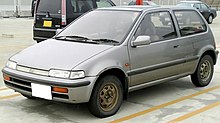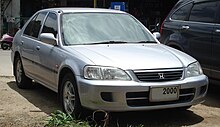Honda City
| Honda City (fit sedan) | |
|---|---|
 (2005 Face-lifted version) (2005 Face-lifted version) | |
| Manufacturer | Honda |
| Production | 1981-1986, 1986-1994, 1996-2002, 2002-present |
| Class | Kei Car (1981-1994) Subcompact (1996-present) |
| Body style(s) | 2-door convertible 3-door hatchback 4-door sedan |
| Layout | Front engine, front-wheel drive |
| Engine(s) | 1.3L - 1.5 L L15A VTEC/i-DSI N/A I4 |
| Transmission(s) | CVT, 5-speed Automatic |
| Wheelbase | 96.4 in (2449 mm) |
| Length | 172.8 in (4389 mm) |
| Width | 66.5 in (1689 mm) |
| Height | 58.4 in (1483 mm) |
| Curb weight | 2149 lb (975 kg) |
| Related | Honda Fit Toyota Vios Nissan Tiida |
The Honda City is a subcompact car manufactured by the Japanese manufacturer Honda since 1981 for the Asian market.
First generation (1982-1986)
The first Honda City was launched in 1981 as a three-door hatchback. It was one of the first "tall" hatchbacks: to maximize interior room without occupying more road space, the body was taller than usual. At the 1981 Tokyo Motor Show, one gimmick was a folding 50 cc motorcycle (also separately marketed under the name Motocompo) that could fit into the City's boot. A turbocharged version was added to the range in 1982 and a convertible version soon after.
In 1983, the Honda City replaced the Mini in New Zealand Motor Corporation's local assembly line-up. In that same year the car was also released in Australia, although only in a two-seater van variant, to get around that country's import taxes.
Honda exported the City as the Honda Jazz in Europe, the City name being owned by Opel at the time.
City Turbo
In 1982, Mugen developed their first modified car, the Honda City Turbo, a turbocharged hot hatch version of the City.
Second generation (1986-1994)
Honda replaced the original City in 1986 (designated GA1), with an update in 1989 (GA2). This model was produced until 1994. The Fit name also first appeared as a trim variant of the City. There was no convertible model. In most European and Australasian markets, the City's market position was filled by the Honda Logo in 1999.
Third generation (1996-2002)
The third-generation Honda City, codenamed SX8, was based on the EK Civic platform. It was designed for and sold in the South East Asian market only.
This City is still a subcompact slotting beneath the Honda Civic, but a four-door sedan model instead for developing markets in Asia, and was built in India, Thailand, Malaysia, Indonesia, Philippines and Pakistan. A revised, face-lifted third-generation City was released in 2000, and included sports sedan models powered by Honda's 1.5 L VTEC engines.
The third generation city had the D-series engines, namely variations of the D13B and D15B. The d15B was reduced in power for the Asian markets where the car was marketed, but had a good power to weight ratio. The kerb weight of the car was 985 kg, and the output of the D15B was 115 hp (86 kW).
Fourth generation (2002-present)
In November 2002, the fourth generation City was released and included a four-wheel drive version. Like the contemporary Honda Jazz, the City is actually a rebadged Honda Fit, in the City's case a rebadged Fit Aria.
In September 2005, a face-lifted version of the City was launched in Thailand and in Malaysia in October 2005; it is known as the City ZX in Thailand, India, the New City in Malaysia and City in Singapore and Pakistan. The most significant changes are a new exterior (new front grille, new headlamps, new fog lights, new taillights and bumpers). The front end has been extended forward by 65 mm (2.6 in) while the rear has been extended by 15 mm (0.6 in). The side mirror is electronically foldable. Both the i-DSI and VTEC trim levels have 15-inch (380 mm) alloy wheels as standard equipment. Interior changes are minor but it does include an armrest for the driver and additional map lights.
The engine remains the same but the intake manifold has been modified, resulting a 10% temperature drop in the intake air temperature (IAT), the suspension has been upgraded as well.
Honda City in Thailand, Philippines, Singapore and Malaysia are using CVT gearbox for both i-DSI and VTEC variants. The CVT gearbox is equipped with a Simulated 7-Speed Automated Manual Transmission (AMT) using paddle shift buttons. This is very rare for a subcompact of its class.
Fuel Consumption
The 2005 face-lifted Honda City i-DSI achieved an impressive 26.2 km per liter (61.6 miles per gallon) of fuel consumption during a challenge in June 2007. The challenge requires the vehicle to be occupied by 4 persons (including the driver), air conditioning being switched on and a load of luggage. The whole route stretched more than 660 km that consists of not only highway driving but also hill climbing.
Advertising
The music group Madness appeared in a Japanese TV ad campaign for the Honda City. The jingle was written by the entire band, which also appeared in the TV ad, doing its famous "nutty walk". The band apparently liked the jingle so much that they expanded it into a three minute pop song and released it as a b-side (B/W "Cardiac Arrest") that reached #14 in the UK charts. It was also included on Complete Madness, the band's best-selling greatest hits compilation from 1982. The track version of "In The City" replaced the repeated brand name "Honda Honda Honda..." with the more generic "doomba doomba doomba". The TV advertisements were included (though not listed) on the Divine Madness VHS video in 1992.
Popular Culture
The Honda City appears in the popular Transformers toy line as the Autobot Skids
The arcade game City Connection features a Honda City.








![Validate my RSS feed [Valid RSS]](valid-rss-rogers.png)















































































1 ความคิดเห็น:
If you wow gold were in wow gold any doubt buy wow gold that the buy wow gold God Wars cheap wow gold Dungeon was cheap wow gold challenge enough wow power leveling for you, wow power leveling look no further power leveling than the giant power leveling demon, K’ril wow gold Tsutsaroth. Once buy wow gold thought of as cheap wow gold nothing more world of warcraft gold confirm his existence.ug
แสดงความคิดเห็น